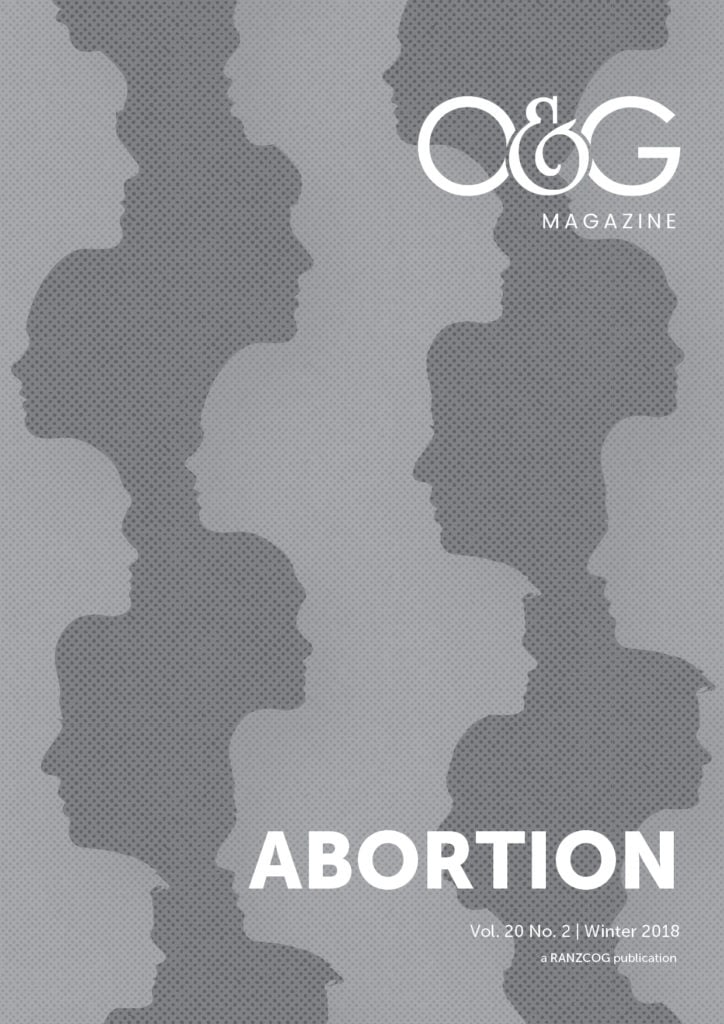It was not without irony that I read O&G Magazine Volume 19 No.4 Summer 2017, focusing on domestic violence and reflected upon my own recent experience with the media. Many of my colleagues may have seen me interviewed for ‘7.30’ on the ABC in December 2017. I was asked to represent RANZCOG as a general gynaecologist, which I was happy to do. I did research to ensure that I was across the evidence and could reasonably reflect the position of the College, the specialists in family planning and contraception, and the average working O&G. I am, however, also a woman and have ridden the contraception roller coaster myself.
I was extremely disappointed in the approach taken by an otherwise responsible media organisation. Feedback from colleagues and patients have been similar to my own. I was disappointed at the sensationalist portrayal of a mode of contraception that has effectively revolutionised gynaecology. This mode of contraception has allowed women to avoid surgery to manage menorrhagia, allowed women to control their fertility so reliably, allowed women to change their minds with an immediate reversion to their natural fertility and, on top of it all, made it affordable and accessible.
When I was interviewed, I told the truth, based on scientific facts. The program featured the devices Implanon and Mirena. ‘7.30’ outlined their possible side effects – awful, permanent, disfiguring side effects. Reasonably minded women would have dismissed them as a contraceptive they would not touch with a 50-foot barge pole. That makes me feel sad and angry. Why? Because when such devices are portrayed in a negative light, the average woman will believe what they are told and keep away. Yet, what is excluded from their report is the overwhelming weight of international scientific evidence that supports their safety, effectiveness, reliability and cost-effectiveness. Why bother to include that information? Not when you can interview two individual women regarding their anecdotal experiences, an epidemiologist who has a theory about corporate greed, and then share some horrific photos lifted off the net that makes the home audience collectively grimace.
Why am I sad and angry? When irresponsible reporting such as this occurs, it reinforces the oppression of women. It scares women, so they do not have the benefit of making an informed choice. In doing so, it continues to deny women choice; it denies them truth; it keeps them impoverished. It ignores the fact that many women are already impoverished, in violent relationships, in controlling relationships, where the ability to control their own fertility is already compromised. These women end up with unplanned pregnancies. Then they have to choose to either birth or terminate. The decision to terminate is rarely taken lightly. Women are affected emotionally, even if it the best decision for them. Of course, having a medical or surgical termination has risks and side effects too. For those women who keep the pregnancy, birthing an unplanned baby has life-long effects. It may preclude a woman from going back to work and thus she remains financially dependent. It may place pressure on her relationship. It may affect her relationship with that child, or with the other children in the house. It may put so much pressure on a family that it could increase the stress, resulting in the possibility of domestic violence.
Australian women of my, and my mother’s, generation remember the terrible consequences of older style IUDs, like the Dalkon Shield, that were associated with infertility as a result of severe pelvic infections. Class actions against the manufacturers drew a lot of media attention and no doubt those women were never really appropriately compensated for the devastation caused to their lives. This was in the days before IVF, before safe sex campaigns. Now things have changed. IUDs are simply not associated with infection like they used to be, not because the drug company tells us that, but because international evidence tells us. Not research funded by drug companies, but from studies performed by a scale of people from medical students, to junior training gynaecologists, to university medical schools and international scientific institutions.
As a result of these historical disasters, women were warned off having an IUD. As a young woman, and then as a doctor, I have always been very negative about the concept of putting an IUD in a woman who has not yet had children (in the 1990s I would never have had an IUD myself). The ‘pill’ became the treatment of choice for Australian women. The world-changing miracle that is the oral contraceptive pill put the control of fertility into the hands of women themselves. However, it has NOT seen the unplanned pregnancy rate fall to zero. Why? The reasons unplanned pregnancies occur are many and varied. Reasons include contraceptive failures, poor timing of intercourse because women don’t understand their fertile times, or have irregular periods that make it difficult to time when fertility is highest. Sometimes very young women have a kind of fertility denial, such that, they unconsciously tempt fate to see if they can fall pregnant, then have to deal with the issue when they do fall pregnant. Sometimes, however, women are sexually controlled by their partners, who will not wear a condom but will not allow their partner to take the pill. Sometimes women in violent and dysfunctional relationships are raped by their partners. Sometimes these women simply cannot afford to pay the PBS cost of the pill, even if it is subsidised for concession card holders or pensioners.
The most offensive aspect of the whole story is that the portrayal of particular drugs or devices as good or evil does a major disservice to women. The cynic in me sees that it makes a controversial media story and that gets viewers. The conspiracy theories of nasty ‘Big Pharma’ are an easy way to get an angry emotional reaction. Journalists love to feel like they are making an Erin Brockovich-style exposé. It’s harder to accept that we rely on big pharmaceutical companies to research and develop these drugs and devices that can help people. Certainly, the government is not pouring money into research and development of women’s health products. The government completely underfunds women’s health. The last 20 years has seen postnatal admission times in hospitals more than halve, with no increased outpatient support for new mothers, and it has all gone under the radar. There are no coordinated protests outside maternity hospitals demanding care and justice for mothers. It is interesting that the ‘7.30’ story did not go back to the woman having her Implanon inserted at the beginning of the program and ask her what she thinks about long-acting reversible contraception (LARC). I am sure she adores and has been devoted to the child she birthed when only a teenager, but how would her life have been different if she had not had that unplanned pregnancy?
So what about LARCs. Do not rely on the ABC to give you a ‘fact check’ on them, because if they did, the story would be different and boring. LARCs work, for most women, not all. You might see stories on the ABC condemning domestic violence. Rightly so. How might the situation change for victims of domestic violence if they could control their fertility and afford contraception that works? What if they could ensure they don’t have an unplanned pregnancy that keeps them locked into a cycle of poverty? It is so much easier to condemn something, but far more difficult to discuss the solutions. The ABC chose to do a 20-minute story to scare women, deny them choice, keep them in poverty and oppression, and pretend to be the hero administering ‘truth’. Before I was interviewed (being cynical of the media), I asked the reporter, Sophie Scott, what the purpose of the story was, the ‘angle’. She seemed a reasonable person, a responsible journalist, a woman and a mother. I asserted that I hoped ‘7.30’ would not act to condemn IUD devices, because they are revolutionary in women’s health and can do a lot of good. She told me: ‘We are not “A Current Affair”’. Well, Ms Scott, it sure looked like it to me.






Leave a Reply